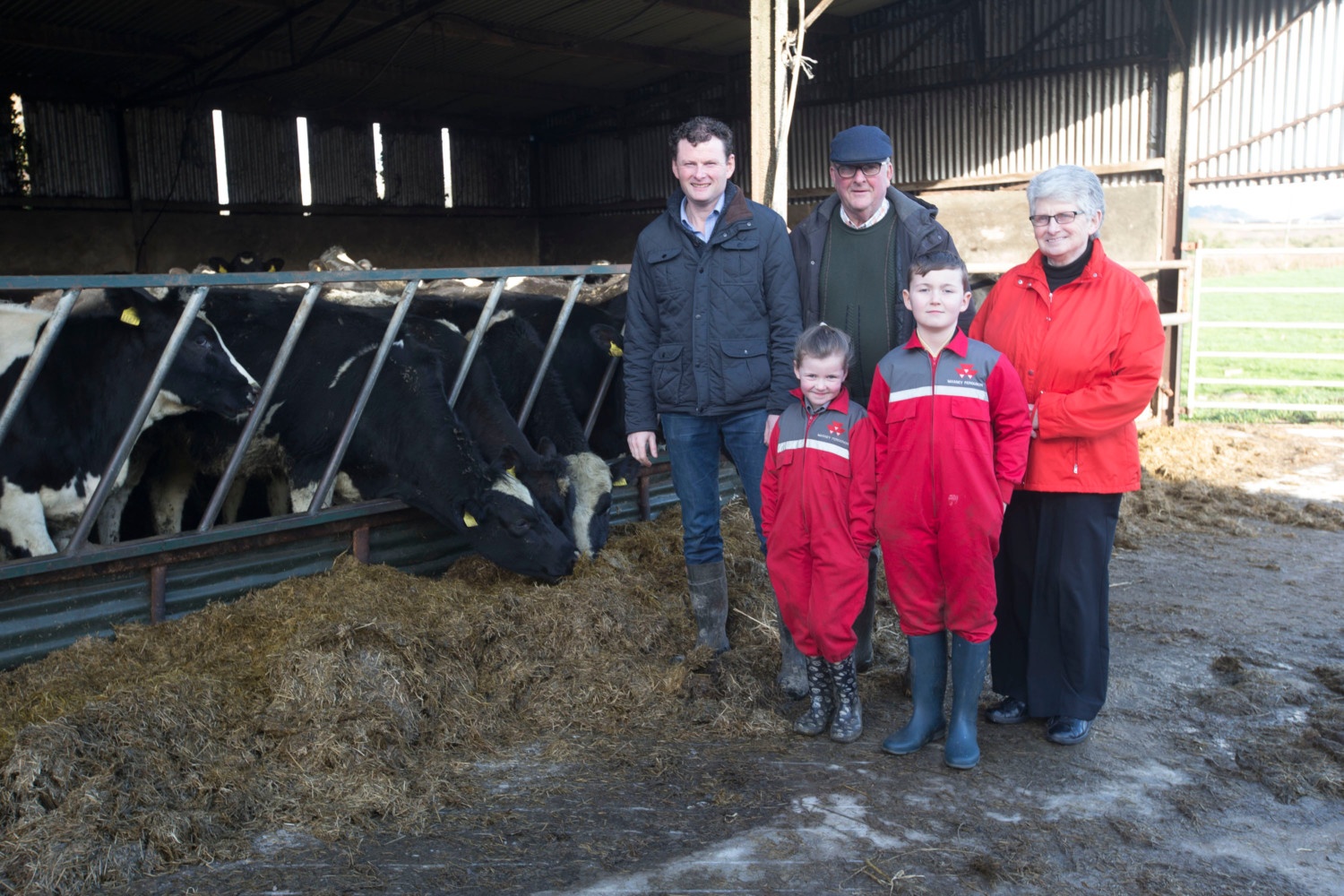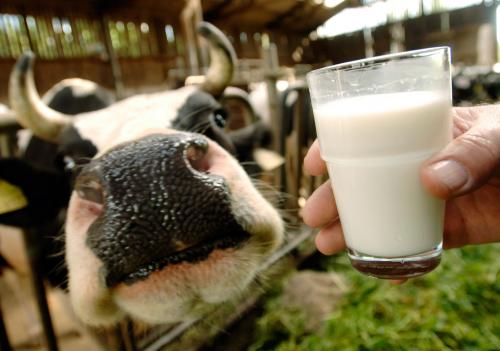Farmer who fronted McDonald’s beef campaign moves into dairying
In his more than 20 years farming, Liam Delaney has done everything he knows how to do to make beef production work, inside and outside the farm gate and in terms of advocating for the sector.
“I talked and listened to experts, always adopting and adapting to the latest thinking and technology, in terms of grass management and maximising animal output. We have done the profit monitor since they started. We also grow our own grain, so have it at first cost.”
He’s in a discussion group, is actively involved with the IFA, and has always participated in any necessary lobbying, of meat factories or politicians, also regularly hosting farm groups.
Last October, Liam (41) hosted a visit to the family farm near Portlaoise by Minister Michael Creed on behalf of the IFA as it pushed for a €200/head support payment for suckler cows in the budget. At the time, a switch to dairying wasn’t really on the horizon.
With his dad Jim (71), Liam has been running an 80-cow suckler herd on 165 acres on the edge of Portlaoise.
In the 1990s, Jim was a founding member of the first beef discussion group in the country. Beef has been the main enterprise on the farm since it was bought in 1970 by Jim’s father, Bill. Beef farming is in the Delaney’s blood.
 22
22“We love suckling and love breeding the best stock we can, doing the job as best we could. We have always been progressive,” says Liam.
But, over the past number of months, Liam increasingly realised that all the pieces of an inevitable jigsaw were falling into place.
“So many things are against beef. It’s not just one year, it’s a pattern, and it’s steadily getting worse,” Liam says.
“It’s Brexit … but it’s a lot more than that. Look at the growth in beef coming out of the dairy sector, and that’s only going to keep increasing.”
A big eye-opener for Liam was his visit last year to the Open Day on the Newford Farm. Its mission is, “to demonstrate the potential of a moderately large suckler beef farm to generate a viable family farm income when operated to the highest level of technical efficiency and best practice”.
“They are doing everything to the highest possible standard but are still not getting anyway near that target,” he says.
Angry
Liam is angry too at the direction CAP has taken, in the diversion of payments away from active farmers, which was what it was supposed to be about. He fears that this trend will continue to intensify in future reforms.
“The original idea was to support the people producing food to keep consumer prices down. That’s all changed. Now it’s moving to a per ha basis.”
Nor is there the support at national level. Instead of the €200 sought, the budget yielded a €40 payment in the BEEP scheme. “Look, don’t get me wrong, €40 a cow is a help but it’s not enough; in dairy terms, so I’m told, it’s four day’s milk.”
Then there is the attitude that has been adopted towards young bulls, “who are the most efficient food converters but the move is towards steers. If we had to go back to them, we’d need to be getting at least €1/kg more and there is no sign of that happening.
“When you are as efficient as you can possibly be inside the farm gate, the only thing that makes a difference is price,” says Liam.
But Liam points out that the meat factories are holding very firm on that front, basically saying that, “if you can’t make it work at current prices, just give up. They are obviously happy enough that they will get as much beef as they want from the dairy herd”.
“At the moment, farmers are literally having to beg meat factories to take cattle, especially bulls. No dairy farmer has to beg the co-op to take their milk.”
As for the recent talk about the establishment of a label for suckled beef, Liam can’t hide his exasperation.
“Ireland has gotten good markets in Europe on the back of the suckler cow but suckler people haven’t been paid for that. It’s never been marketed as a premium product. This is coming 20 years too late; it’s too late for me anyway.”
While the beef enterprise is making some profit, about €200/cow which, on their 80-cow herd, equates to €16,000, “it’s just not enough to live on”.
“I never want to be a millionaire. I only want to make a living and keep the farm maintained.
“We try to do something every year. If you are not able to do that, you will run it into the ground.”
The obvious attraction of dairying is its profitability.
He had no interest in contract rearing, “you might as well set the land as that” or in part-time farming, as “that’s just another term for double-jobbing.”
“I just want to farm… my own stock… and make a living for myself and my family. We have four young children; all I want is to make the farm sustainable for them in the same way that it was when I came to it.”
“I am lucky, too, that my parents, Jim and Frances, and wife, Brenda, back me. So I am in a position to do it,” he adds. A lot of the farm has been transferred to Liam and, from a young age, he has been involved in the decision making.
Liam feels that now is the right time to make the move. “I could stay going but I am at an age that if I didn’t do it now, I would never do it.”
He knows of people who would want to change but can’t, “because they don’t hold the reins and their parents say that what they’re doing it will do for their time. It’s no good to someone getting the farm when they are 60.”
‘Mind-blowing’ robotic technology ready to roll in the milking parlour
Liam Delaney lights up when he starts talking about the Lely robot that will milk his 70-cow dairy herd.
“The technology is mind blowing; it’s amazing all the things it can do, from testing for mastitis, the right time to AI, optimising feeding, etc.
“I am very excited about going dairying. Making the decision was the hard part,” he says, with what sounds like relief. “It’s not easy when you have to accept that your best isn’t good enough.”
So nobody is more disappointed than Liam himself at having to switch focus from beef to dairying. But he is confident that the move is the right one for himself and his family.
As always, he did plenty of research and it all pointed in the one direction.
Among those he spoke to are several farmers in his beef discussion group who have gone dairying, “not one of them regrets their decision or would return to beef.”

“Beef prices may turn around again and dairy prices might come back but they would have to halve to be where beef is at.”
Now, Liam is embracing dairying with the same enthusiasm and professionalism that he previously demonstrated for suckling, a reputation marked in 2012 by his being selected as the first Irish farmer to ever feature in a television ad for McDonald’s beef.
“I’m absolutely up for the challenge. I was up there with the best at the beef. I think the standard in the dairy sector is very high. But I hope that, if I was good at one, that I might become good at the other, as a lot of the principles are the same.”
There are a variety of reasons why he decided to go for a robot and has settled on 70 cows.
Liam says that the farm is not ideally set up for dairying, as just 40ac is in the home block, with the rest spread out among four other blocks.
He will also be continuing to grow 50 acres of cereals and with some contract work treating grain for storage with Maxammon. Up to next year, he will also have to keep on some suckler cows due to his participation in the genomics scheme.
As things stand though he has been told that it is a “fool’s game”, he is also intending to finish the beef progeny that will come from the dairy herd.
Another significant factor is that he hopes this approach will allow him spend more time with family, wife Brenda and four young children (the eldest is 11), rather than if he was to go the conventional route.
Liam is currently in the midst of buying in-calf heifers with an average EBI of 180. He is also in the process of applying for planning permission to build a parlour (with room to possibly install a second robot at a later stage) and a new cubicle shed, whilst also converting an existing shed.
“Our kids will be heading to college within the next decade, and I would hope that, by then, the back will be broken in the loan that has been taken out to fund the switch.
“What I am hoping is that, in the not too distant future, I will be able to close the door at the end of the year and say that I have been rewarded for my time.”

SEEDS by materials Independent
Головні новини Seeds та агроідеї для зростання вашого бізнесу в Telegram Facebook InstagramYoutube та Підписуйтесь!



